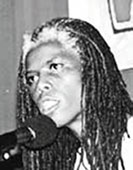The transformation of Malcolm X
Published May 12, 2005 6:18 PM
The following is excerpted from a talk by San Diego International Action Center organizer Gloria Verdieu to a Feb. 19 anti-war and social justice conference held in Los Angeles.
A library in San Diego is the only library in the country named after Malcolm X. The children were asked to name this library. There should be many libra ries named after Malcolm, being that he read the entire Merriam-Webster dictionary while spending six years in prison.
When people refer to the transformation of Malcolm, we have to ask which transformation are they referring to.
The first Malcolm is the child, Malcolm Little. By age 13, Malcolm had seen his house burn down. He had been exposed to the violent death of his father by racists and seen the slow breakdown of his mother. His brothers and sisters were placed in foster homes.
When asked by a teacher in the eighth grade what he wanted to be, Malcolm’s reply was “a lawyer.” This teacher had not studied the history of Black people. If he had he would have strongly encouraged Malcolm to become a lawyer so that he could fight the draconian, backward racist laws.
The second Malcolm, a teenager, searched and examined the values of his peers, which included the zoot suit and the burning of your scalp enough to approximate the appearance of a white man’s hair.
The third Malcolm stood up for his people when Black people were being beaten in the streets, publicly humiliated and killed. He understood that people like himself in the streets, and in the prisons, had contributions to make. Malcolm, like Mumia Abu-Jamal, spoke for the voiceless. He spoke for the jobless and for the homeless.
The fourth Malcolm announced his split with the Nation of Islam in March 1964. He then made the pilgrimage to Mecca and flew to Beirut, Cairo, Lagos and Accra. He encountered people of all races, many fighters against all kinds of oppression. He spoke to whites as well as Blacks.
In June 1964, Malcolm announced the formation of the Organization of Afro-American Unity.
Malcolm attended the Organization of African Unity conference in Cairo. He was the only North American allowed to attend and submitted a paper on the plight of the 20 million Afro-Americans in the U.S. He had lengthy conversations with Julius Nyer ere of Tanzania, Jomo Kenyatta in Kenya, Milton Obote in Uganda, Kwame Nkrumah in Ghana, and Sekou Toure in Guinea.
On his return home, Malcolm announ ced, “The newly awakened people all over the world pose a problem for what is known as western interests, which are imperialism, colonialism, racism. ... Just as the external forces pose a grave threat, they can see that the internal forces pose an even greater threat.”
In February 1965 this statement was made by Malcolm concerning the OAU: “We Afro-Americans feel receptive toward all peoples of goodwill. We are not opposed to multi-ethnic associations in any walk of life.”
Malcolm explained why the OAU must be exclusively for people of African descent, but also indicated that he was willing to work with whites.
Malcolm spoke in Alabama on Feb. 3 and 4, 1965, before traveling to Britain and France on Feb. 6-13. He was detained in France and put on a plane back to London.
He returned to the U.S. on Feb. 14 to find his home had been fire-bombed, but he spoke in Detroit, after making sure his family was taken care of.
Malcolm knew his days were number ed. This is a statement by Malcolm in his autobiography, which he did not live to read.
“You’ll find very few people who feel like I feel that live long enough to get old. ... When I say by any means necessary, I mean it with all my heart, and my mind and my soul. But a Black man should give his life to be free, but he should also be willing to take the life of those who want to take his. It’s reciprocal. And when you think like that you don’t live long.”
At the Feb. 16, 1965, Rochester meeting, Malcolm said, “Anybody of African ancestry in South America is an Afro-American. Anybody in Central America of African blood is an Afro-American. Anybody here in North America, including Canada, is an Afro-American if he has African ancestry—even down in the Caribbean, he’s an Afro-American ... the Afro-American is that large number of people in the Western Hemisphere ... all of whom have a common heritage and have a common origin.”
If Malcolm X were alive today, he would turn 80 years old on May 19.
Articles copyright 1995-2012 Workers World.
Verbatim copying and distribution of this entire article is permitted in any medium without royalty provided this notice is preserved.
Workers World, 55 W. 17 St., NY, NY 10011
Email:
[email protected]
Subscribe
[email protected]
Support independent news
DONATE


